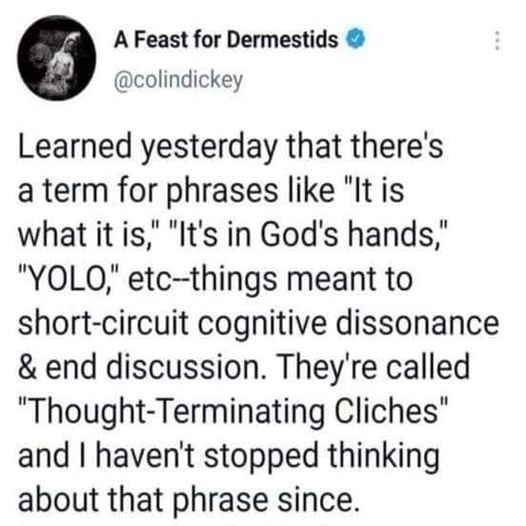this post was submitted on 16 May 2024
1145 points (98.1% liked)
People Twitter
7993 readers
1454 users here now
People tweeting stuff. We allow tweets from anyone.
RULES:
- Mark NSFW content.
- No doxxing people.
- Must be a pic of the tweet or similar. No direct links to the tweet.
- No bullying or international politcs
- Be excellent to each other.
- Provide an archived link to the tweet (or similar) being shown if it's a major figure or a politician.
founded 2 years ago
MODERATORS
you are viewing a single comment's thread
view the rest of the comments
view the rest of the comments

This term seems like just an insult wearing academic robes. And a tautology. All cliches over simplify the world, side-stepping complex analysis.
There's nothing "thought terminating" about acknowledging that a problem is beyond your scope - which is what the first two mean. I've only heard YOLO used to encourage risk-taking, which is completely different.
Realistically, these are often just social cues that you're bored with the conversation.
Obviously whether you use a cliche to avoid thinking deeper on a topic or for some other reason changes with each use. It's not inherent to the phrase.
I don't think either of these are really thought terminating cliches inherently. The phrase is more for their usage as a rhetorical device to end arguments in certain ways. They become them when they are "used to intentionally dismiss dissent or justify fallacious logic" (https://en.wikipedia.org/wiki/Thought-terminating_clich%C3%A9)
Ending an argument often involves dismissing dissent. The end of an argument is also the end of thought on that argument. You’re just rewording the original term, that you’re arguing against.
It's not productive to argue endlessly.
I disagree.
Source?
I was just joking about arguing endlessly, by carrying on an argument.
No you weren't.
Yeah they were.
No I wasnt
Source?
Source: them's be they, tho
*though
Your argument is in shambles.